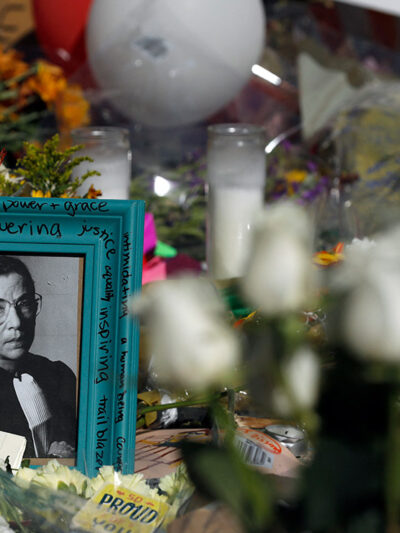News & Commentary
Sep 23, 2020
OP-ED: Charleston must build a public safety system for all
This op-ed was published by Charleston City Paper on September 23, 2020. Read the full piece here.
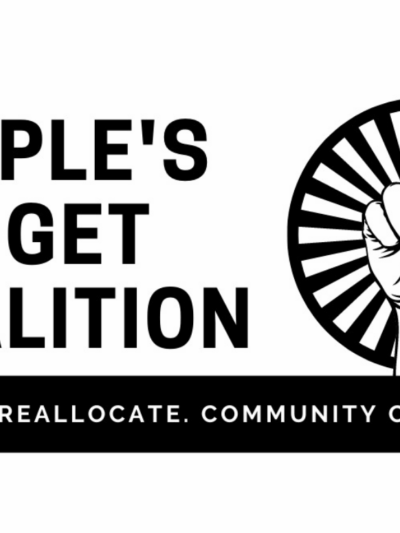
Sep 22, 2020
Ruth Bader Ginsburg’s Fight for Gender Equity was for All of Us
Ria Tabacco Mar, Director, Women’s Rights Project
Ruth
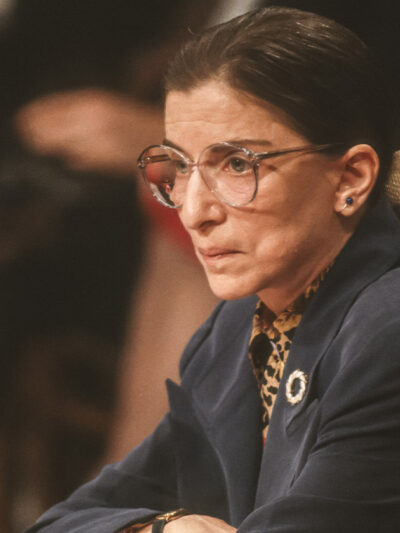
Sep 18, 2020
A step forward for voting rights in South Carolina
This week, Governor McMaster signed into law legislation that will better protect voters in the November general election during the COVID-19 pandemic. The Governor’s action takes away one of the two hurdles to safe voting during the COVID-19 pandemic, and comes after a federal lawsuit brought by us and the NAACP Legal Defense and Educational Fund.Until this week, eligible voters in South Carolina faced two hurdles to safe voting. First, people who wished to vote absentee faced an “excuse” requirement that failed to provide an accommodation to allow all eligible voters to vote absentee during the pandemic. Second, people who vote absentee are required to have a third-party witness signature on their ballot envelope.Requiring voters to be physically present at their traditional polling places during the COVID-19 outbreak — where they will be congregating and waiting in line with others in order to vote — is contrary to the advice of public health experts. In addition, in the midst of a pandemic, the witness requirement also puts people’s health at risk.Thanks to the legislature’s and Governor McMaster’s actions, eligible South Carolina voters will now be allowed to cite COVID-19 as a valid reason for voting absentee. But, the legislation signed into law does not address the witness requirement, which makes voting from a safe social distance impossible for those who live alone.We are asking the courts to remove this remaining hurdle to safe voting in South Carolina so that no South Carolina voter will need to choose between their health and their vote.Stay tuned. As soon as we have clarity from the court around the witness requirement, we will send out voting rights education materials so that all South Carolinanians will understand the process for voting absentee in November.
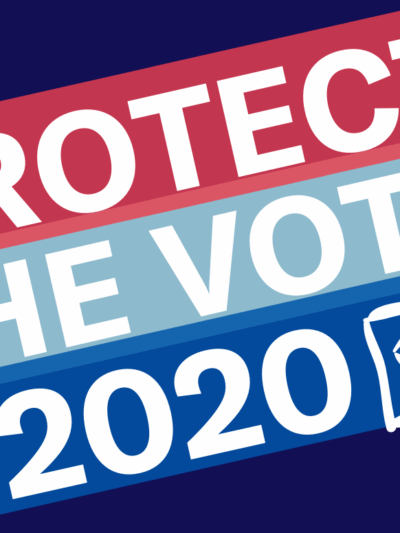
Sep 01, 2020
Another Weekend of Police Violence in Charleston
This past weekend, people protesting in Charleston for racial justice and against police violence were again met with police violence. This has become a disturbing pattern.This recent police escalation comes nearly three months after Charleston area law enforcement departments, including the Charleston Police Department, participated in mass police violence on May 31 in Marion Square, deploying potentially lethal weapons against people peacefully protesting. And, later that night area law enforcement continued their violence against Eastside community members.Our city leaders must not allow this police brutality to continue. Our repeated calls (here and here) for accountability have been met with silence from Charleston Police Chief Reynolds and other local and statewide law enforcement leaders whose officers have repeatedly executed this violence against protestors. It is unconscionable that law enforcement have chosen to respond to community concerns about police violence with silence.It has been over eight months since the publication of the CPD racial bias audit, which found, among other things, that Black community members were 2.8 times more likely to face the use of force from CPD officers. Despite these serious concerns documented in the audit, 2020 CPD data continues to paint a disturbing picture. For example, while Black and white people use marijuana at roughly the same rate, so far this year Black people are approximately 8 times more likely to be arrested for marijuana possession and 10 times more likely to be cited in Charleston. And, these disparities have increased over the 2019 disparity rates.The recent police violence coupled with the continued massive racial disparities in the enforcement of our laws is a contradiction of city leaders’ claims to be invested in racial justice.Over the past several years, the City of Charleston has taken steps to demonstrate to the community a concern for racial justice, including apologizing for its role in slavery, commissioning a racial bias audit of the police department, establishing the “Special Commission on Equity Inclusion and Racial Reconciliation,” and removing the Calhoun monument from Marion Square.Now is the time to follow these gestures with concrete actions to reduce harms enacted on Black people in Charleston. In the birthplace of America’s first police force which was originally established as a slave patrol, this expansion of policing is a direct dismissal of the outcries of Black people who continue to be oppressed by the racist foundation and structure of policing in Charleston.Law enforcement’s perpetuation of these violent attempts to silence their critics serves as an important reminder that our policing system isn't broken — it's working as it was designed. Police actions this past weekend made another great case for why we must drastically reduce the role of policing in our society, especially in communities of color that historically have been over-policed.
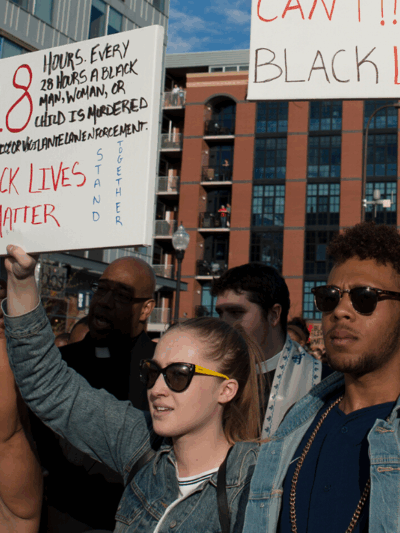
Aug 11, 2020
The U.S. Postal Service Was Never a Business. Stop Treating it Like One.
When the Continental Congress appointed Benjamin Franklin as the first Postmaster General, our nation had not yet been founded. The Bill of Rights would not be drafted for another 16 years. Yet nearly two and a half centuries later, the United States Postal Service’s ability to provide every person in America with a private, affordable, and reliable means to exchange information transformed it from a mail delivery service into a baseline for the exercise of American constitutional rights. Recent news that the Postal Service’s financial condition is being used as a pretext for degrading its service – including allowing mail to go undelivered for days and scaling back the hours of or closing post offices – threatens to degrade that constitutional baseline as well.In an early response to novel coronavirus, Congress allocated $10 billion to help shore up the Postal Service’s finances, but the Treasury Department has held up those funds without explanation. Instead, Postmaster General Louis DeJoy is preparing to make dramatic service cuts, treating the USPS like a private business facing bankruptcy. This should draw universal condemnation.The U.S. Postal Service was never a business. It is an essential government service guaranteed to the American people by the U.S. Constitution and it should be preserved accordingly.To understand how the Postal Service became so central to America’s national identity and the actualization of our constitutional rights, one needs to examine its history.In the earliest days of our nation, Americans were more likely to identify themselves as citizens of their home states than of the United States. For our nation’s first generation, the Postal Service was often the only reminder the U.S. had a federal government at all. As America expanded westward, the Postal Service enabled new states like California, which otherwise would have been isolated by America’s vast Western Territories, to forge its connection with the rest of the country. Ultimately, the roads, rail stations, and rural post offices that were built or subsidized by the Postal Service drove our nation’s physical unification. Even more important were the nationwide communications the Postal Service enabled. Prior to the invention of the telegraph, the absence of a local post office made exchanging ideas with the rest of the country impossible. In America’s early decades, one of the most vital steps taken by newly established towns was to request a post office. Recognizing that receiving information was as critical to our national unity as communicating it, Congress mandated the Postal Service deliver newspapers for free or at a minimal cost. As George Washington wrote in 1788, “I entertain a high idea of the utility of periodical publications … spread[ing] through every city, town and village in America. I consider such easy vehicles of knowledge, more happily calculated than any other, to preserve the liberty, stimulate the industry, and meliorate the morals of an enlightened and free People.” Low-cost newspaper delivery endured until the Congressional Postal Reorganization Act was adopted in 1970.Prior to the 1850s, the delivery of free newspapers and of mail to isolated frontier towns caused the Postal Service to lose money. It likewise strained the Postal Service’s financial resources when, in the mid-19th century, it decided to charge the same price for all first-class letters sent within the U.S. regardless of their destination. These choices were possible then because the Postal Service was not burdened with financial self-sufficiency. Its sole mandate was to enable everyone in America to communicate affordably. In that respect, the Postal Service’s public benefit mission is more akin to the Armed Forces’ than FedEx’s, and no one is suggesting the military should pay its own way or face bankruptcy.Another important piece in the Postal Service’s preservation of civil liberties came in 1877, when the Supreme Court, in Ex Parte Jackson, ruled that “No law of Congress can place in the hands of officials connected with the postal service any authority to invade the secrecy of letters and such sealed packages in the mail.” As a result, the privacy of communications sent via the USPS is constitutionally guaranteed. Good luck getting that with Gmail.The year 2020, perhaps more than any other in American history, illustrates why Postal Service’s centuries-old mission must be upheld.The U.S. Census Bureau, which is presently racing to complete the 2020 census, is relying on the Postal Service for much of its data collection. Government health agencies are depending on the USPS to provide critical COVID-related health information and supplies. Elected officials are using the Postal Service for cost efficient and sometimes free communications with their constituents, including about support programs during the ongoing economic crisis. And as we approach the November election, state and local election boards will be relying more than ever on the USPS to conduct voting by mail, which is critical to guaranteeing the right to vote during the ongoing pandemic. Troubling though it may be, it is impossible not to worry that our unpopular president, who has already called for the delay of his own re-election vote, is seeking to degrade the Postal Service’s ability to timely deliver ballots, particularly in communities that are unlikely to vote for him.Earlier this year President Trump called the Postal Service “a joke,” but there is nothing funny about the steady degradation of an institution that breathes unimaginable life into our constitutional rights. At this critical time, Congress should do everything in its power to ensure the USPS remains vibrant and strong, and that burden falls largely on the Senate Committee on Homeland Security and Government Affairs and its chair, Sen. Ron Johnson, and the House Committee on Oversight and Reform, and its chair, Rep. Carolyn Maloney. Every member of Congress and every American, regardless of political party or philosophy, should be grateful that for 245 years “neither snow, nor rain, nor heat, nor gloom of night stays the [Postal Service’s] couriers from the swift completion of their appointed rounds.” We should ensure that “nor politically-motived cost savings” is added to that list.
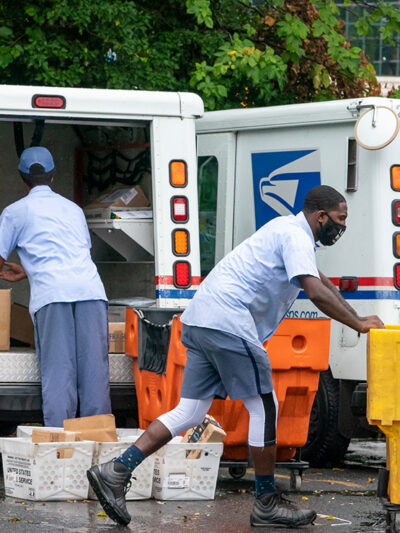
Aug 04, 2020
ACLU Seeks Information on Government’s Aerial Surveillance of Protesters
By: Jay Stanley, Nationwide ACLU Senior Policy Analyst and Nicola Morrow, ParalegalIn the midst of nationwide protests against police brutality, local, state, and federal law enforcement agencies have reacted with brutal force and widespread surveillance. Not only are many agencies suppressing protest and intimidating protestors with batons and tear gas on the ground — they are also circling overhead. The government is using a deeply invasive, coordinated aerial surveillance campaign to monitor Black Lives Matter protests, gather information, and surveil people exercising their First Amendment rights. Today, the ACLU submitted Freedom of Information Act (FOIA) requests to the Federal Aviation Administration, Department of Homeland Security, and the Department of Justice calling for more information on the use of aerial surveillance on protesters. The government has deployed helicopters, airplanes, and border drones over American cities to systematically monitor peaceful protests . An investigative report by the New York Times found that the Department of Homeland Security alone had logged at least 270 hours of surveillance footage on these racial justice protests this spring and summer. The collected footage was ultimately channeled into a digital network — accessible by federal and local law enforcement agencies for use in future investigations — with the ominous name “the Big Pipe.” Other law enforcement and military agencies, including the FBI, National Guard, and local police departments also requested deployment of private or government-owned aircraft for the purpose of surveilling protests. This widespread surveillance has been carried out across the country — from the big-city protests in NYC, Portland, Chicago and LA, to 20-person protests in small towns across the country. This surveillance has also been carried out with an unjustifiable level of secrecy. Agencies like the FBI regularly try to hide the identity of their aircraft by registering them through dummy corporations. For weeks, U.S. Customs and Border Protection refused to say which agency had requested use of its Predator border drone over Minneapolis protests in May. Protesters and communities still have no idea what kind of cutting edge, high-tech equipment these aircraft — piloted and unpiloted — may be carrying. As aerial surveillance continues, the public deserves much more information. In our FOIA requests, we are asking for information about the involvement of private companies; coordination between different law enforcement agencies; the processes by which surveillance flights are proposed, approved, or authorized; the scope of surveillance; the capabilities of the cameras and other surveillance tools deployed; and the surveillance footage itself. We live in a democracy and Americans have a right to decide what kinds of surveillance law enforcement is permitted to engage in over our communities. But we can’t do that if we don’t know what’s going on. A prime example of government policymaking that needs more sunlight is the FAA’s issuance of a “temporary flight restriction” over Portland in July, as that city became the center of renewed nationwide protests over police abuse in general and abusive practices by federal officers, sent to the city over local objections, in particular. Unfortunately, there is a history of the FAA creating flight restrictions over protests at the request of law enforcement to limit the ability of reporters and community members to engage in aerial photography of police behavior. The agency restricted airspace over the Dakota Access Pipeline protests in 2016, and before that in Ferguson, Missouri during the 2014 protests following the death of Michael Brown. In 2014, documents and audio recordings proved that the purpose of the Ferguson no-fly zone was not the protection of public safety, as government agents claimed, but to keep news helicopters away. In Portland, Oregon, the FAA’s restrictions prohibit drones except for those with “an approved special governmental interest airspace waiver that has been granted for operations in direct support of an active national defense, homeland security, law enforcement, firefighting, search and rescue or disaster response mission.” In short, this flight restriction leaves room for government agencies to use aircraft to surveil the public, but severely limits the ability of the public to record the government. That may be how law enforcement agencies like it, but it’s exactly backward: Government surveillance of the public should be strictly regulated, but the public’s ability to monitor what law enforcement officials are doing should be broadly free and unrestricted. That is why protesters should be able to record the police using drones — and that is why we have filed a FOIA request to find out more about aerial surveillance of protests by law enforcement.
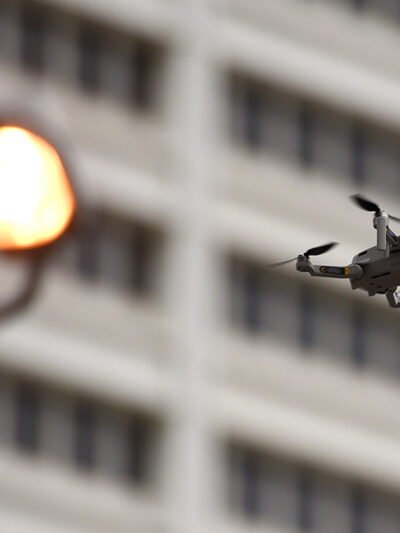
Jul 31, 2020
Police Divestment Efforts Must Include Universities
Sanjali De Silva, Communications Intern
Desp
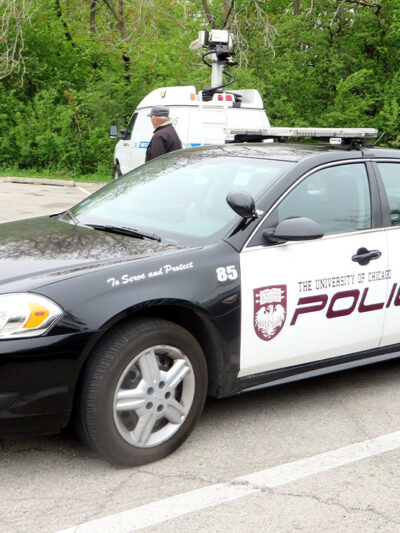
Jul 29, 2020
We're still waiting for the Charleston Police Department to hold its officers accountable for violence against protestors
Today we sent a second letter to the City of Charleston reiterating objections to mass police violence in and around Marion Square by the Charleston Police Department (CPD) on the afternoon and evening of Sunday, May 31, 2020. This action follows an initial letter we sent on June 2 calling on local law enforcement leaders to publicly explain their rationale for responding to non-violent protests against police violence with more police violence. The June 2 letter also issued a list of demands including a public apology from law enforcement leaders as well as outlined plans for holding officers accountable and guaranteeing people’s right to protest in Charleston.On June 22, nearly 60 days since this police brutality, the city finally responded. In their letter, they bypassed our questions and demands and defended law enforcement’s actions on May 31.The CPD has attempted to justify its actions on May 31 by pointing to events that happened during the previous evening. But, the CPD’s own policy on use of force clearly states that force is only justified in times of imminent danger. A past event, even by their own standard, is not an acceptable reason for Charleston police officers to carry out mass violence and deploy potentially lethal weapons against people peacefully exercising their Constitutional rights.In addition to the use of force policy outlined in the CPD’s General Administrative Order, officers also violated the department’s rules on the use of chemical agents, which are only deemed necessary “where a serious danger to life and property exists and other methods of apprehension would be ineffective or more dangerous.”Our letter also raises concerns about excessive and unprovoked violence carried out by police on residents of Charleston’s Eastside neighborhood on the evening of May 31. The city and Charleston Police Chief Reynolds have dismissed concerns from Eastside residents and their allies about CPD’s violent actions in their neighborhood. This excessive, unprovoked police action is a part of a pattern against Black Eastside community members that cannot be ignored. Residents have called for services that will improve safety and, instead, CPD is using city resources to increase patrols. We know what happens when police go down this road, it’s not new. All this will do is further criminalize Black and poor people.
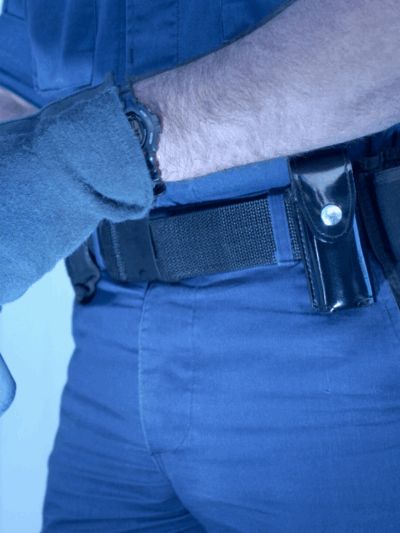
Stay Informed
Sign up to be the first to hear about how to take action.
By completing this form, I agree to receive occasional emails per the terms of the ACLU’s privacy statement.
By completing this form, I agree to receive occasional emails per the terms of the ACLU’s privacy statement.

